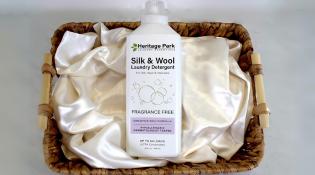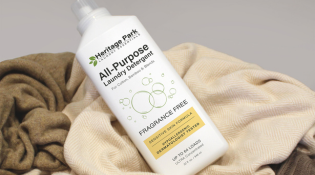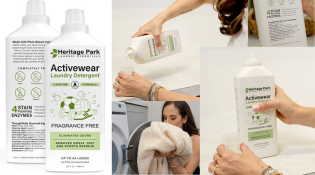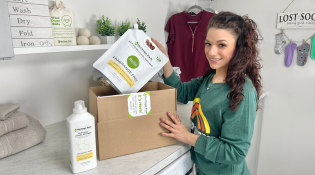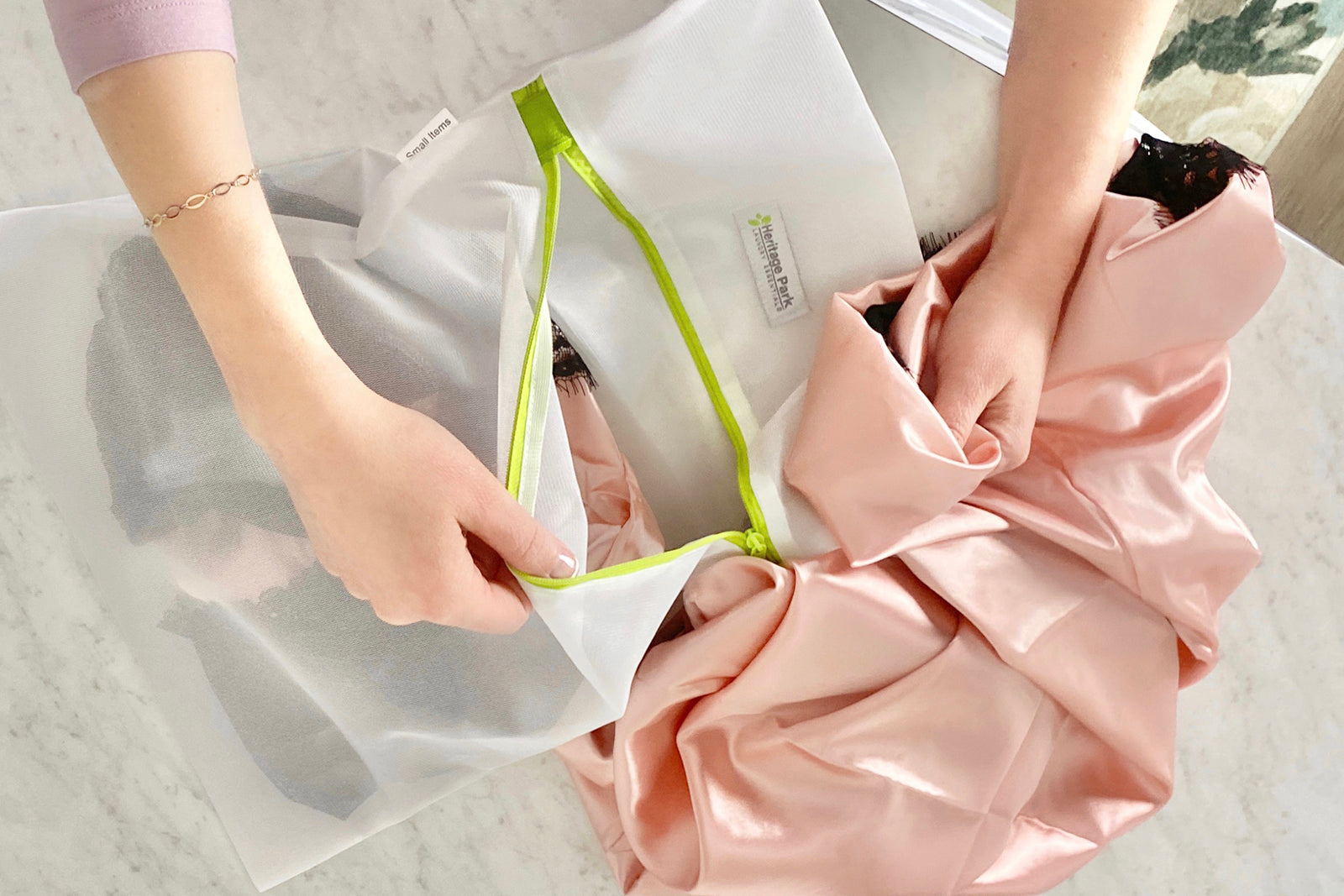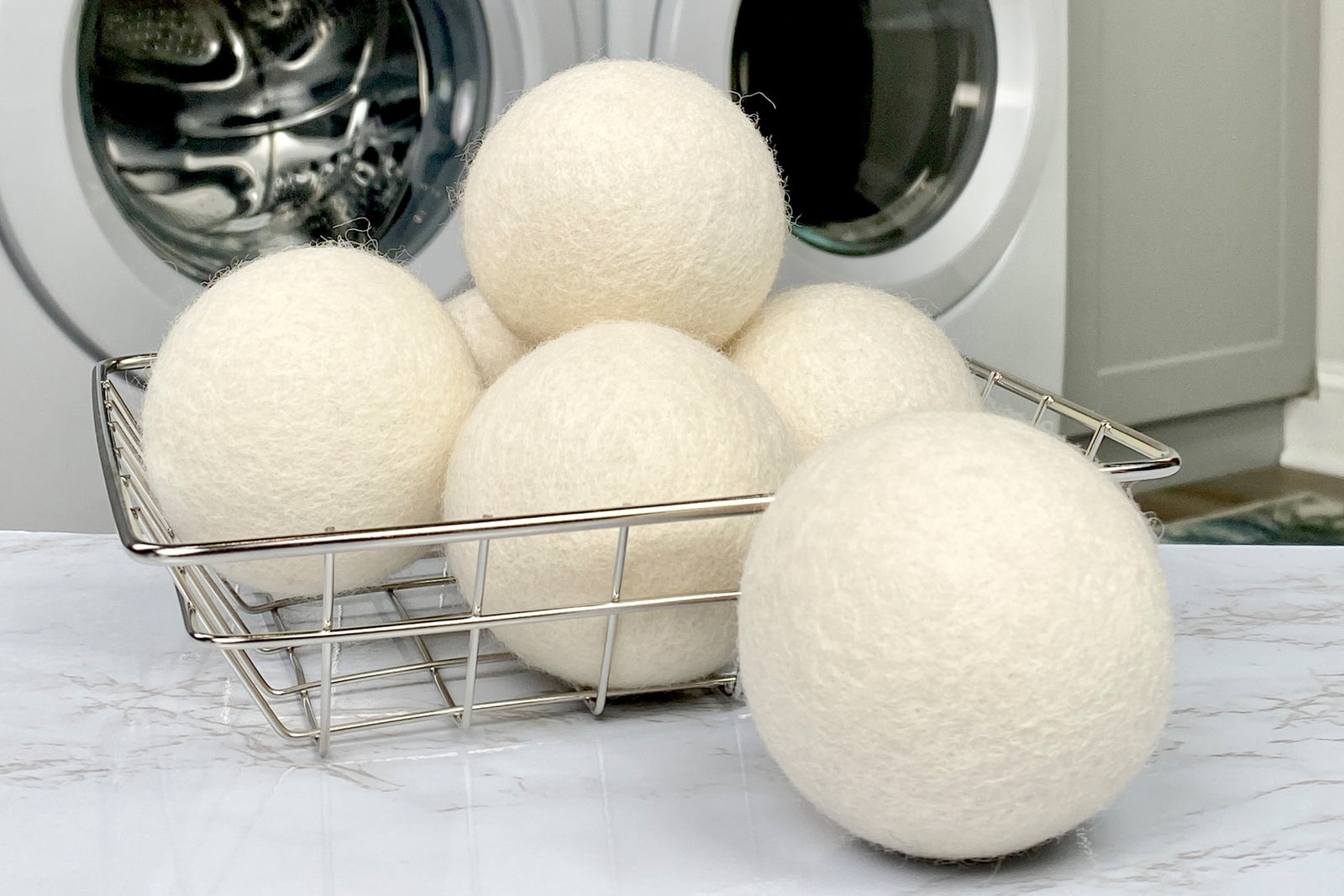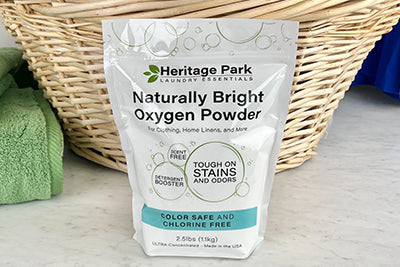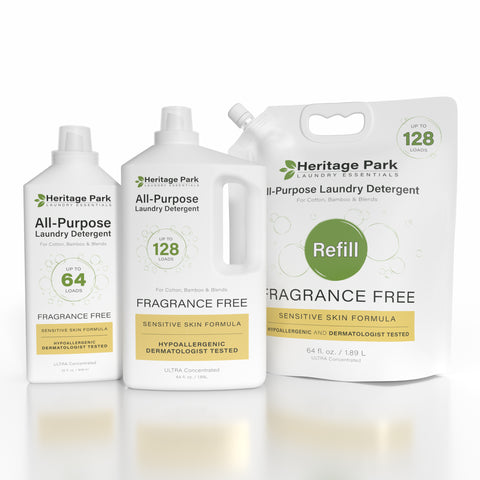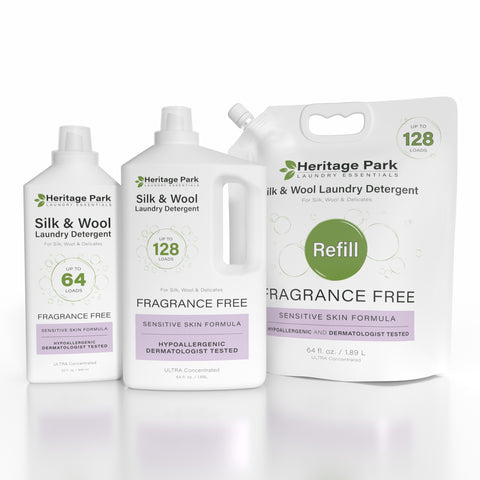This article, from the experts at Heritage Park Laundry Essentials, offers information and guidance on choosing the best laundry detergent for sensitive skin. It covers what you should look for (and what to avoid) in a sensitive skin detergent.
If you or your family have sensitive skin, you carefully consider every product that comes in contact with your body, including your laundry detergent. Indeed, the residue from harsh detergents can linger on clothes and household linen, causing ongoing skin irritation and discomfort. No matter your skin type, avoiding an allergic reaction or skin irritation comes down to knowing what to look for in a laundry detergent.
Key Takeaways
|
Understanding Sensitive Skin and Its Triggers
Sensitive skin isn't just one condition; it encompasses various skin types and concerns that require special care:
Eczema (Atopic Dermatitis): This chronic condition causes dry, itchy, and irritated skin. Traditional laundry detergents can trigger flare-ups due to their harsh chemicals and high alkalinity levels. When eczema-prone skin comes into contact with irritating detergent residue, it can lead to intense itching, redness, and inflammation, all of which further degrade skin’s protective barrier.
Psoriasis: This autoimmune condition creates scaly, irritated patches on the skin. Harsh detergents can strip away natural oils and disturb the skin's delicate pH balance, potentially worsening psoriasis symptoms and causing unnecessary discomfort.

Contact Dermatitis: This adverse reaction is quite common and occurs when skin comes into direct contact with irritants. Common detergent ingredients like optical brighteners, phosphates, and artificial fragrances are frequent triggers for contact dermatitis, causing redness, itching, and burning sensations.
Baby and Toddler Skin: By definition, babies and young children have naturally sensitive skin that's still developing its protective barrier. Their delicate skin is particularly vulnerable to harsh chemicals and synthetic fragrances. Baby detergent should be chosen with gentleness in mind.
Acne-Prone Skin: While not traditionally associated with laundry care, residual detergent chemicals can clog pores and irritate acne-prone skin, especially when it comes to towels and bedding in contact with sensitive facial skin.
7 Tips for Picking Laundry Detergent for Sensitive Skin
No matter the underlying skin condition, choosing the right laundry detergent is essential for skin health. Here's a detailed guide to selecting a detergent that's both gentle on sensitive skin and tough on stains.
1. Use a High-Quality Liquid Detergent
A concentrated, liquid laundry detergent is the best option for sensitive skin, as it dissolves more fully and rinses out better than powder detergent. A concentrated, liquid detergent is also easier to measure to get the proper amount for your laundry load.
2. Only Natural, Plant-Based Ingredients
The foundation of any skin-friendly detergent starts with its ingredients. Look for formulas made from natural, plant-based cleaning agents instead of synthetic chemicals. from plant-derived cleaning agents rather than synthetic chemicals. Natural ingredients like coconut oil-based surfactants, enzymes, and mineral-based cleaning boosters effectively remove dirt and stains while being gentle on sensitive skin. Regular detergent brands (the kind found in the grocery store) often contain harsh chemicals like phosphates, sulfates, and optical brighteners, which can irritate skin and trigger flare-ups
3. Steer Clear of Dyes and Fragrances
Artificial fragrances and dyes are among the most common triggers for skin reactions. Even products labeled "unscented" may contain masking fragrances, so look specifically for "fragrance-free" options. Dyes serve no cleaning purpose and can be particularly problematic for those with contact dermatitis or sensitive skin, so pick a clear detergent. Natural detergents should leave your laundry smelling clean and fresh without artificial perfumes (particularly important for baby clothes and bedding).
4. Protect Skin With pH-Neutral Formulas
Your skin's natural pH balance is slightly acidic (around 4.5-5.5), and maintaining this balance is crucial for skin health. Many commercial detergents are highly alkaline, which can disrupt the skin's protective barrier and lead to irritation. Choose a pH-neutral detergent that works in harmony with your skin's natural chemistry. This is particularly important for those with eczema or psoriasis, where maintaining skin protective function is essential for managing symptoms.

5. Go Hypoallergenic for Highly Sensitive Skin
For those with highly sensitive skin or specific allergies, a hypoallergenic detergent can be the best option. These formulations are specifically designed to minimize the risk of allergic reactions and skin irritation. This is particularly important if you have multiple skin sensitivities or if your skin reacts easily to new products.
6. Insist on Independent Certifications
Don't just take the manufacturer's word for it – look for products with independent certifications from recognized testing organizations. These certifications verify claims about hypoallergenic composition, skin safety, and environmental impact. Key certifications might include:
- Dermatologist tested and approved
- Pediatrician recommended (especially important for baby items)
- Independent, third-party hypoallergenic certification
- Environmental certifications for biodegradability
- Third-party lab testing for skin sensitivity
- Allergy-specific certifications
7. Look for Proven Cleaning Effectiveness
While gentleness is crucial, your detergent still needs to get the job done. Modern enzyme-based formulas are a natural solution for cleaning without the use of harsh chemicals. Look for a detergent with a combination of enzymes to attack different types of stains naturally. A good sensitive skin detergent will achieve this cleaning power while maintaining its gentle, skin-friendly properties. It should work effectively in all water temperatures and be compatible with both standard and HE washing machine types.
Keep in mind that skin sensitivity varies among individuals, and what works for one person may not work for another. When trying a new detergent, test it first on a few items that come into direct contact with your skin, like pillowcases or undergarments. Monitor how your skin responds and adjust your choice as needed.
Not Sure Which Detergent to Use?
Not Sure Which Detergent to Use?
Making the Switch to Sensitive-Skin Friendly Detergent
Here are some tips from the Heritage Park team on transitioning to a new detergent:
- Double Rinse Initial Loads: Run an extra rinse cycle for the first few loads to ensure complete removal of any residual chemicals from previous detergents.
- Start Small: Test the new detergent on a few items first, as noted above.
- Skip the Fabric Softener and Dryer Sheet: These products contain additional chemicals that can irritate sensitive skin and damage clothing and household linen.
Heritage Park All-Purpose Laundry Detergent: Your Best Choice for Sensitive Skin
Heritage Park All-Purpose Laundry Detergent is the perfect laundry detergent for protecting sensitive skin. Our concentrated, pH-neutral formula that is made without harsh chemicals (no dyes, sulfates, phosphates, chlorine, bleach, or brighteners). Instead, Heritage Park uses a proprietary blend of five enzymes to break down and remove tough stains:
- Protease: Targets protein stains including food stains such as egg and milk; mud or grass stain; and blood and other body fluids.
- Alpha-amylase: Removes starches from gravy, cereal, or pasta.
- Pectate Lyase: Attacks pectin stains from fruits and vegetables.
- Lipase: Works on greasy food stains like butter and oil and lipstick/cosmetic stains.
- Mannanase: Breaks down mannans which are thickeners used in food and personal care products like deodorants.
Our fragrance-free All-Purpose and Silk and Wool Detergents are also independently certified hypoallergenic; pediatrician- and dermatologist-tested; and EWG VERIFIED as meeting the Environmental Working Group’s strictest criteria for transparency and health. If you don’t need a verified hypoallergenic detergent, we offer fragranced detergents in Spring Magnolia, Shore Breeze, and Lavender Mist varieties.
Heritage Park All-Purpose Detergent can be used on cotton, polyester, acrylic and synthetics, bamboo and other wood fiber-based fabrics, blends, and more. (To clean protein-based fabrics like silk, wool, and cashmere, use enzyme-free Heritage Park Silk and Wool Detergent.) Heritage Park Laundry Detergents are made in the United States in small batches for quality control and are biodegradable and septic/greywater safe.
We hope this article provides the information and confidence you need to choose the best sensitive skin laundry detergent for your family. And please keep in mind that using a natural, sensitive-skin friendly laundry detergent benefits more than the individual with skin concerns; it is better for the entire family and for the environment.
People Also Ask
What is the best detergent for highly reactive skin?
If your skin is highly reactive, either from dry skin, acne breakouts, eczema or another skin concern, we recommend using a certified hypoallergenic, fragrance-free, liquid laundry detergent.
Can sensitive skin symptoms be made worse by detergent?
Yes, skin can become itchy, red, raw, scaly, or breakout if you are allergic or sensitive to a detergent. These reactions also damage the skin’s barrier function so it is less protective, which begins a cycle of irritation.
Why is my skin so sensitive to laundry detergent?
Your skin can be sensitive to laundry detergent for many reasons, including skin conditions like eczema, psoriasis, or atopic dermatitis, as well as environmental allergies.
What does detergent dermatitis look like?
Detergent dermatitis is an itchy rash with redness and red blisters. The blisters may scale over and in general the skin will be inflamed.


